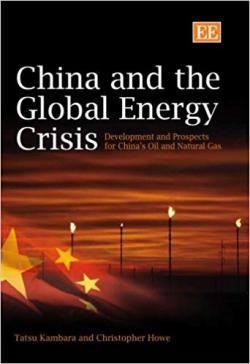China and the Global Energy Crisis - Development and Prospects for China's Oil and Natural Gas

By Tatsu Kambara and Christopher Howe
Edward Elgar Publishing (2007)
ISBN-13: 9781845429669
Review by J. Sean Curtin
China's sky-rocketing energy demands are a significant factor helping push global energy prices steadily upwards. The seemingly unquenchable Chinese thirst for oil and gas is already putting tremendous strain on Tokyo's energy security strategy as resource poor Japan struggles to compete with its power-hungry neighbour. This superbly research and timely book offers in-depth analysis of China's energy industry covering everything from its domestic oil and gas sectors to refining capacity and energy prospects as well as its future needs and the likely international impact. Understanding the global and regional dimensions of the rapidly shifting East Asian energy equation is becoming imperative as Beijing's current and future energy needs are reshaping the dynamics of the world economy and rewriting geo-political relations.
The steep rise in Chinese energy demand is a concrete sign of Beijing's emerging superpower status. In 1976 China was a significant energy exporter, but by 2006 it was consuming approximately 8% of the world's oil output while only producing 4%. The massive deficit is a factor partially explaining why world energy prices have risen so rapidly in recent years, but the complete picture is, of course, far more complex. Increasing uncertainty over the security of supplies and the rise of India are also equally important factors in the equation.
The book comprehensively traces the dramatic history of the Chinese gas and oil industry from its early days to the present and provides projections for future developments. Despite various difficulties and setbacks in the early decades, "Deng Xiaoping's policy of reform and the 'open door' changed the prospects for the industry by enabling it to tap into foreign resources of many kinds, by bringing China into international oil and energy markets, and by revolutionizing the organization and management practices of the pre-reform industry" (page 26).
The book gives a fairly comprehensive account of all of China's on-shore and off-shore oil and gas fields plus infrastructure initiatives like the massive West to East gas pipeline project. China's current on-line natural resources span a huge area stretching from the Central Asia oil fields of the far-flung Xinjiang province to the controversial Pinghu gas field in the cold depths of the East China Sea.
The analysis is accompanied by useful maps and charts as well as facts about areas of potential reserves such as the Manjar West oil and gas zone in Xinjiang's remote Tarim Basin which "Japanese and other foreign companies have been allocated blocks for survey and exploration work on the basis of production-sharing agreements" (page 88). The Tarim Basin in particular holds great potential but also enormous challenges. The authors comment, "the prospect of large revenues from development of the Tarim fields and the pipeline raises major political issues for Beijing" (page 95)."
Determining exactly how much potential oil and gas reserves China has is extremely difficult, the authors feel that most assessments underestimate the situation, and "there are probably substantial opportunities for further petroleum exploration in China" (page 43).
The book provides a superb analysis of China's refining and distribution capacity, pointing out imbalances and anomalies in the current system. One of the few criticisms one can make of this work is that some of the information is rather too technical for the non-expert, but this is generally compensated for by the introductions and summaries in each chapter which lay out the main facts in a clear and understandable fashion.
The final chapter presents the key points in a digestible format with some interesting analysis. Projections about future development and outlooks for the various energy sectors are also provided, enhancing the overall work. Some important reminders are given about the difficulties of producing accurate projections and how some factors such as innovation can rapidly alter the status quo. The authors observe, "because of rapid modernization and structural change in the economy, Chinese energy-using patterns are shifting in quite radical ways - mostly in the direction of becoming more energy intensive" (page 111). The dynamics are changing at breakneck speed as the phenomenal growth in car ownership demonstrates while the extensive development of the road infrastructure network seems certain to generate an even bigger demand for gasoline which is certain to have a global impact (page 103). This trend has the potential to harm Japan which competes for resources with the same suppliers.
The authors conclude that based on the present evidence, China's oil demands are manageable and will not necessarily lead to any destabilization in global energy markets. There is a need to further develop the domestic market and continue economic and structural reforms. Future supplies from the newly emerged Central Asia nations are also likely to alter Beijing's relationship with these nascent states and change the geo-political dynamics of the region. There is great potential for future partnerships and cooperation with foreign nations, especially Japan, which is a leader in energy-saving technology, something Beijing desperately needs. The Middle Kingdom's energy requirements are enormous and how it meets them will have a massive regional and global impact.
Despite the book's rather alarming title the overall analysis is not a particularly negative one and it finishes on a fairly positive note rather than predicting a crisis. The authors contend that the global impact of China is not necessarily harmful for the world economy, while strong Chinese demand is likely to cause some serious headaches for Tokyo and change the geopolitical status of Beijing's energy rich Central Asian neighbours. This well-researched study represents a significant contribution on a topic of immense regional and global importance.

